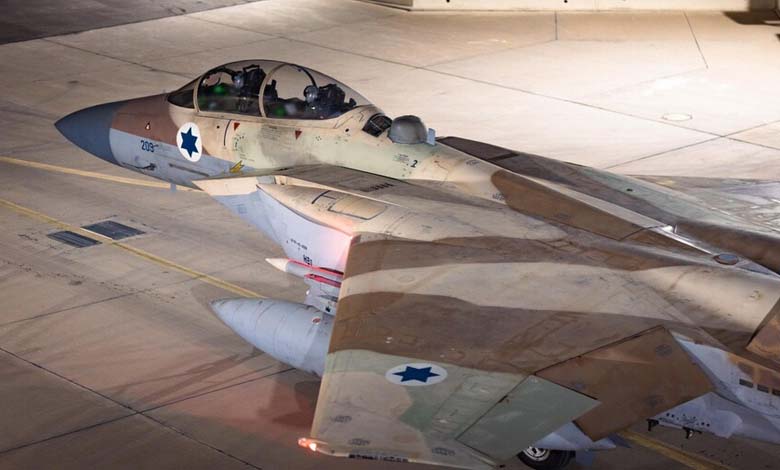Israel Seeks to Block a Promising Deal to Develop Egypt’s Air Force

The Israeli military leadership is growing increasingly concerned about Cairo’s attempts to acquire European Eurofighter Typhoon jets, which can be equipped with Meteor long-range air-to-air missiles.
-
Hasm Resurfaces: Training Video Raises Fears of New Threat to Egypt
-
The Muslim Brotherhood and June 30: A Divided Diaspora and a Movement in Clinical Death
Israeli media reports have revealed rising alarm within political and military circles in Tel Aviv over Egypt’s ongoing efforts to modernize its air capabilities. This concern has prompted active Israeli efforts to thwart arms deals that could provide Cairo with advanced strategic capabilities and threaten what Israel sees as its “qualitative military edge” in the region.
According to Nziv Net, an Israeli website specializing in security and military affairs, Israel is closely and anxiously monitoring Egypt’s ambition to acquire Eurofighter Typhoon fighters—particularly those capable of carrying the highly advanced European Meteor missiles, considered among the most dangerous air-to-air missiles globally.
-
Israel Warns Rafah Residents… A Worsening Tragedy and a Potentially Expanding Maneuver
-
Gaza after the War: Divergent Plans and Risky Scenarios
What heightens Tel Aviv’s concern, the report says, is the Israeli military’s understanding of the Meteor missile’s capabilities: extreme speed, long reach, and the infamous “no escape zone”—an area where enemy aircraft cannot evade once the missile is fired.
Israeli experts argue that Egypt acquiring this type of aerial weaponry—especially when integrated with advanced fighter jets—would present a new challenge to the Israeli Air Force, which currently operates F-15s, F-16s, and F-35s. This could limit Israel’s operational freedom and erode its long-standing air superiority, traditionally regarded as a cornerstone of its national security.
-
Egyptian Initiative to Convince Washington on Gaza Reconstruction Plan
-
Experts Reveal the Muslim Brotherhood’s History of Violence and Terrorism in the Arab Region – Details
Although the potential Egypt-Europe deal remains in its early stages, Tel Aviv has reportedly launched diplomatic efforts years ago to prevent its conclusion. Israeli concerns now extend beyond the type of aircraft to the accompanying weapon systems—particularly long-range, high-destructive-power missiles.
In this context, Nziv Net reports that Israel is not fundamentally opposed to Egypt acquiring modern fighters, but strongly objects to the integration of weapon systems that could shift the regional military balance. This stance reflects Israel’s enduring commitment to maintaining its “qualitative military edge,” a strategic doctrine followed for decades to ensure its dominance over any regional military power.
-
Gaza and Trump’s Ambitions… A “Fragile” Truce Struggling to Hold
-
The Egyptian Media Syndicate responds to the Muslim Brotherhood’s lies about Egypt’s stance on the Palestinian cause
Despite Israeli pressure, Egypt appears unwilling to abandon its modernization agenda. According to the official Egyptian presidency website, the Egyptian Air Force has already received Meteor missiles as part of its Rafale fighter jet arsenal, which currently includes 54 aircraft.
Egypt’s acquisition of these missiles is clear evidence of its continued strategy to diversify its arms sources and bypass U.S. restrictions—particularly Washington’s refusal to supply Cairo with F-35 jets due to political and strategic considerations.
-
Hamas and “the Bibas mystery”: Kidnapped with his family, but returned alone
-
After 8 Months of Closure… Here’s the Date for the Reopening of the Rafah Crossing between Egypt and Gaza
Given the circumstances, analysts note that Egypt has several alternatives, including strengthening its ties with European countries or pivoting toward Russia and China, where it could access comparable missile systems. This shift reflects a gradual transformation in Egypt’s military policy, aimed at achieving strategic independence and reducing reliance on a single supplier.
The Israeli report outlines three main phases in Egypt’s military policy: initial full reliance on the Soviet Union under President Nasser, a shift to American arms following the 1970s peace accords, and, since 2014, a “smart diversification” strategy involving major deals with France, Germany, Russia, China, and even South Korea.
-
Trump Pressures Egypt to ‘Hold Hamas Accountable’
-
Return that Defies “Nakba”: Residents of Northern Gaza between the Silence of the Rubble and the Clamor of Memory
This diversification not only enhances Egypt’s combat readiness but signals a serious intention to reshape the regional order—moving beyond the traditional military frameworks that have governed Middle Eastern dynamics for decades.
Observers expect Egypt to receive indirect European backing in its quest to modernize its air force, particularly as international support for Israel declines due to the repercussions of the latest war in Gaza, which triggered widespread criticism in Western political circles.
-
Israel’s Insistence on Banning UNRWA: What Does This Mean for Palestinians?
-
Rafah Crossing Management: Israel Reveals Key Features of Upcoming Operational Plan
Analysts believe that now is a timely opportunity for Egypt to expand its military procurement options, as the U.S. grapples with multiple global crises and Israel’s image suffers in international public opinion.
The Israeli report concludes with an implicit warning: a shift in the balance of aerial power could redefine the strategic map of the Middle East—recalling the 1973 October War, when Egypt successfully established aerial deterrence through its then-advanced air defense systems.
Now, amid the technological surge in Egypt’s air force, Tel Aviv is once again recalibrating—acutely aware of the growing military strength of its southern neighbor and the concerns it raises among Israeli decision-makers.
-
Gaza Ceasefire: “Slow” Steps Amidst Gaps and Obstacles
-
Israel Accuses 6 Al Jazeera Journalists in Gaza of Belonging to Hamas and Islamic Jihad
-
Imprisoned in Egypt for 14 Years: Who is the Israeli Spy Robert Dassa?












